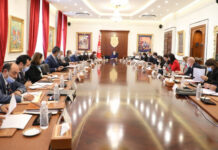
8 May 2021
The moment of truth has arrived for the representatives of the Tunisian government who are discussing with IMF officials. The Tunisian delegation presented its program of action and it did not fail to surprise and leave us stunned…
At first, it was just a letter of intent to take a few big moves to convince the IMF. On site, we were treated to a real surprise with a real detailed program of initiatives to be taken, as if it were a trivial administrative formality.
According to some local economic experts, the document presented to the IMF is indeed similar to what is commonly called “Memorandum of Economic and Financial Policy (MEFP)” in which the government would have recorded everything it intends to undertake to get out of the socio-economic crisis.
A Memorandum of Delirium
To go into details, the government estimates that it will be able to generate a primary budget surplus (difference between own resources and expenditure excluding debt principal) from 2022 while the IMF estimates for its part that this surplus could not emerge before 2026. .
As a reminder, the 2021 finance law provides for a primary deficit in the state budget of more than 7 billion dinars. Regarding the wage bill, the government’s objective would be to limit it to only 15% of GDP from 2022 while the Fund only projects such an objective beyond 2026. For this, the measures are numerous, oriented in the right direction. One can quote among others the optimization of the recovery of the tax debts which would make it possible to increase the budgetary resources of some 800 MD per year over a period of 5 years, or the widening of the tax base by generalizing the VAT to all products on the basis of only 2 rates (7% and 19%) in parallel with an overhaul of the flat-rate tax system and a reduction in the tax burden through, on the one hand, the introduction of a tax on company profits at two rates also (10% and 15%), thus eliminating the rate of 35% and on the other hand the ceiling of the personal income tax (personal income tax) at the rate of 25%. To this, it is also necessary to add a reform of remuneration in the public service which would introduce a variability of salaries according to the results achieved and the objectives set or the reform of the promotion system by seniority which would be extended by 2 years instead of 6 months now.
The plan to transform certain directorates-general of the Ministry of the Economy and Finance into agencies with administrative and financial autonomy, significantly reducing the wage bill of the state budget, is also part of the measures envisaged. Except that no timetable has been established. However, a date is set on other reforms. The total lifting of the compensation is envisaged by 2024. The same would apply to the return to equilibrium of loss-making national companies: 2024 too.
We let you judge the “seriousness” of such a program which directly affects all Tunisians and their daily life. When we talk about reform in administrative management, this can only do good. When we talk about the restructuring of large state-owned enterprises currently in distress, it is part of the recovery of these burdensome companies that require rapid intervention to stop the bleeding. But when it comes to the full lifting of compensation and in just three years, it can only be delirium and “lies” that even IMF experts find hard to digest.
How dare this government decide to completely get rid of the compensation burden in such a short period of time without consulting civil society stakeholders before going to brag about this discovery to the IMF?
What does this government intend to do to actually reduce the wage bill to just 15% of GDP? Are we going to get rid of a large number of civil servants and how are we going to compensate them?
To wrest this famous credit of $ 4 billion, Meshishi and his government risk endangering already precarious social stability. Moreover, the first reactions did not take long and we expect to see the UGTT (Tunisian General Labor Union) and other structures of civil society bitterly contest this memorandum and attack the government with all the consequences that could result from it.
There is no doubt that, back in Tunis after its American journey, the delegation responsible for initiating talks with the International Monetary Fund (IMF) for financial support for its reform program will have to be held accountable not only on the content of the discussions with the multilateral financing institution but on the program document that it presented in return for this famous loan and which will allow the IMF to take an entire country hostage in these difficult times of pandemic and economic crisis which borders on bankruptcy.
In any case, on reading the reform program contained in this document, certain objectives announced by the government are puzzling if not dreamy, concern both public finances and structural reforms.
Faced with the observation of chaotic management by the government in its fight against the Covid-19 pandemic with the explosion in the rate of contamination and death, the saturation of reception capacities in hospitals, the shortage of oxygen and slippages in the vaccination campaign, would it not be possible to question the ability of this government to implement these “generous” promises to the IMF?










